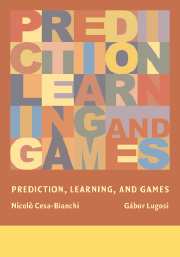Book contents
- Frontmatter
- Contents
- Preface
- 1 Introduction
- 2 Prediction with Expert Advice
- 3 Tight Bounds for Specific Losses
- 4 Randomized Prediction
- 5 Efficient Forecasters for Large Classes of Experts
- 6 Prediction with Limited Feedback
- 7 Prediction and Playing Games
- 8 Absolute Loss
- 9 Logarithmic Loss
- 10 Sequential Investment
- 11 Linear Pattern Recognition
- 12 Linear Classification
- Appendix
- References
- Author Index
- Subject Index
1 - Introduction
Published online by Cambridge University Press: 03 December 2009
- Frontmatter
- Contents
- Preface
- 1 Introduction
- 2 Prediction with Expert Advice
- 3 Tight Bounds for Specific Losses
- 4 Randomized Prediction
- 5 Efficient Forecasters for Large Classes of Experts
- 6 Prediction with Limited Feedback
- 7 Prediction and Playing Games
- 8 Absolute Loss
- 9 Logarithmic Loss
- 10 Sequential Investment
- 11 Linear Pattern Recognition
- 12 Linear Classification
- Appendix
- References
- Author Index
- Subject Index
Summary
Prediction
Prediction, as we understand it in this book, is concerned with guessing the short-term evolution of certain phenomena. Examples of prediction problems are forecasting tomorrow's temperature at a given location or guessing which asset will achieve the best performance over the next month. Despite their different nature, these tasks look similar at an abstract level: one must predict the next element of an unknown sequence given some knowledge about the past elements and possibly other available information. In this book we develop a formal theory of this general prediction problem. To properly address the diversity of potential applications without sacrificing mathematical rigor, the theory will be able to accommodate different formalizations of the entities involved in a forecasting task, such as the elements forming the sequence, the criterion used to measure the quality of a forecast, the protocol specifying how the predictor receives feedback about the sequence, and any possible side information provided to the predictor.
In the most basic version of the sequential prediction problem, the predictor – or forecaster – observes one after another the elements of a sequence y1, y2,… of symbols. At each time t = 1, 2,…, before the tth symbol of the sequence is revealed, the forecaster guesses its value yt on the basis of the previous t – 1 observations.
In the classical statistical theory of sequential prediction, the sequence of elements, which we call outcomes, is assumed to be a realization of a stationary stochastic process.
- Type
- Chapter
- Information
- Prediction, Learning, and Games , pp. 1 - 6Publisher: Cambridge University PressPrint publication year: 2006



